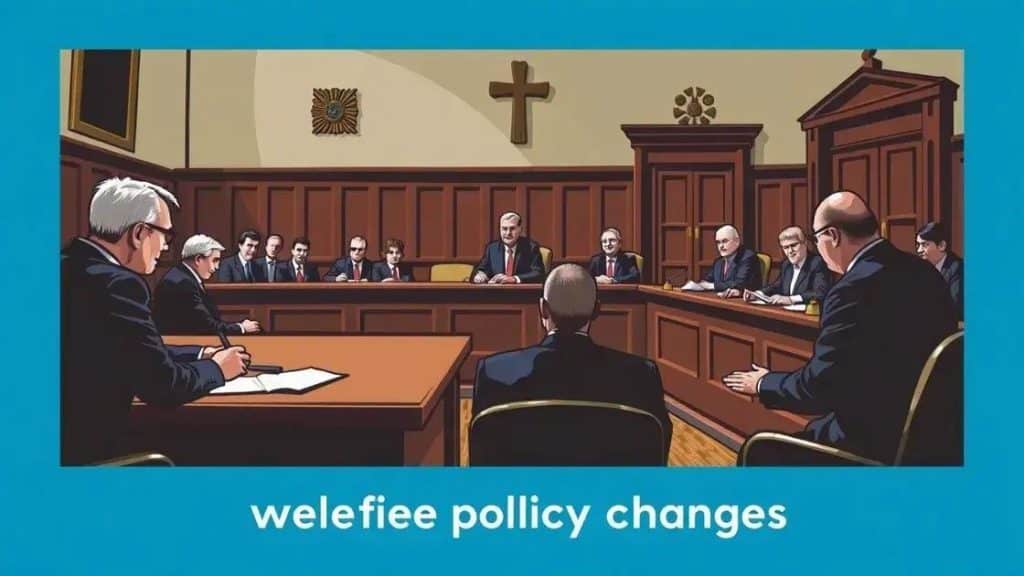Welfare policy changes face legal challenges ahead

Anúncios
Welfare policy changes face legal challenges that significantly impact accessibility and effectiveness, often shaped by court rulings that set crucial precedents for eligibility and program administration.
Welfare policy changes face legal challenges that could significantly influence the effectiveness of social programs. Have you ever wondered how these legal battles might affect the support systems we rely on? Let’s dive into the complexities of this issue together.
Anúncios
Overview of recent welfare policy changes
In recent years, the landscape of welfare has seen significant transformations. Recent welfare policy changes have aimed to adapt to the evolving needs of society and address criticisms surrounding existing programs. Understanding these changes is crucial for citizens and policymakers alike.
Key Changes in Welfare Policies
Several key changes have been instituted to improve the welfare system. These shifts are designed to enhance support for individuals and families facing financial difficulties.
Anúncios
- Increased funding for job training programs
- Expanded eligibility criteria for assistance
- New measures for preventive health care access
- Revised criteria for child support enforcement
Each of these changes aims to foster a supportive environment for those in need while promoting self-sufficiency. Additionally, states have begun to implement pilot programs to experiment with innovative solutions.
Impact of Recent Reforms
These reforms have sparked discussions about the future of welfare. As people question their effectiveness and sustainability, it’s essential to monitor the outcomes closely. Will these policies reduce poverty rates significantly? How will low-income families adapt?
Analysts argue that monitoring and evaluation are critical for success. By gathering data and assessing community needs, governments can make informed adjustments to ensure the welfare system remains effective.
In light of these developments, many citizens are encouraged to learn about their rights and available services. The dialogue surrounding welfare policy changes continues to evolve, and it invites participation from all sides. Engaging in this conversation is vital for shaping a fair and efficient welfare system.
Key legal challenges facing welfare reform

The key legal challenges facing welfare reform have become a focal point of discussion among policymakers and advocates. Various factors contribute to the complexities of implementing changes that align with both legal guidelines and societal needs.
Major Legal Concerns
Several significant legal challenges have emerged as reform efforts proceed. Understanding these issues is crucial for navigating the welfare landscape effectively.
- Constitutional rights and protections
- Disputes over eligibility criteria
- State versus federal authority in program management
- Impact of legal precedents on new legislation
These concerns highlight the need for careful attention to the legal frameworks governing welfare programs. As reforms are proposed, legal experts often warn of potential conflicts that could arise, especially if changes appear to discriminate or inadequately address the needs of certain populations.
Challenges in Implementation
Implementing reforms can also face roadblocks due to existing legal structures. Many advocates argue that laws are not keeping pace with the urgent needs of communities. For instance, regions with significant economic disparities may find it challenging to enact equitable measures that meet legal standards.
Monitoring compliance with new policies becomes vital. Legal challenges can arise from community members who may feel that their rights are being violated. As a result, it is essential for those involved in reform discussions to consider the implications of their proposals.
Conversations about welfare reform and its legal challenges are ongoing. Engaging stakeholders in these discussions can help create a more informed and equitable welfare system that respects the rights of all individuals.
Impact of court rulings on welfare programs
The impact of court rulings on welfare programs is profound and far-reaching, influencing how policies are shaped and implemented. Legal decisions can determine the fate of many welfare initiatives and set precedents for future reforms.
Significant Court Cases
Throughout history, specific court cases have changed the landscape of welfare. These landmark decisions have highlighted the balance between legal rights and the government’s duty to provide support.
- Case A: Addressed eligibility standards for welfare assistance.
- Case B: Resolved disputes regarding access to benefits.
- Case C: Focused on accountability for welfare program administration.
- Case D: Discussed constitutional rights related to welfare.
These cases underscore the importance of the judiciary in shaping welfare policy. As courts interpret laws, their decisions can lead to either broadening or restricting access to benefits, thereby affecting countless individuals and families.
Consequences of Legal Decisions
When courts make rulings, they not only resolve immediate issues but also create lasting changes in how welfare programs operate. For instance, a ruling that favors broader eligibility can lead to increased participation in welfare programs.
Conversely, decisions that impose stricter regulations may limit access, particularly for marginalized groups. This dynamic reflects the ongoing tug-of-war between societal needs and legal frameworks.
The discussions surrounding welfare programs and their legal implications encourage many citizens to engage in advocacy and dialogue. Understanding these impacts is crucial for anyone affected by these policies, as well as for those committed to reforming the welfare system.
Future outlook for welfare policies and legal disputes

The future outlook for welfare policies and legal disputes is a topic of growing importance as communities navigate changing social landscapes. With ongoing discussions surrounding welfare reforms, it is essential to consider how these changes will affect citizens and the legal frameworks involved.
Emerging Trends in Welfare Policies
As society evolves, several trends are shaping the future of welfare. The focus is shifting towards more inclusive and adaptive policies. These developments aim to address the unique needs of diverse populations.
- Increased emphasis on mental health support
- Integration of technology in welfare services
- Greater public-private partnerships for service delivery
- Focus on preventative measures to reduce long-term welfare dependency
These trends indicate a more holistic approach to welfare, aiming to improve the effectiveness of assistance programs and ensure they meet the needs of those served.
Potential Legal Challenges Ahead
As reforms roll out, potential legal challenges will likely arise, especially relating to fairness and access. Advocacy groups and legal experts are closely monitoring how these changes are implemented to protect the rights of individuals.
Moreover, court decisions on related matters can shape future policies significantly. Ongoing litigation may arise around issues such as the eligibility criteria, privacy concerns, and the allocation of resources. Keeping an eye on these developments is crucial for understanding how the welfare landscape may continue to change.
Citizens must remain engaged in the conversation around welfare policies and their implications for the community. Awareness of these developments will be vital to ensuring that these programs are equitable, effective, and aligned with the legal standards designed to protect individuals.
FAQ – Frequently Asked Questions about Welfare Policy Changes
What are the main goals of recent welfare policy changes?
Recent changes aim to increase inclusivity, enhance support for marginalized groups, and improve the overall effectiveness of welfare programs.
How do court rulings affect welfare programs?
Court rulings can set legal precedents that influence eligibility criteria, access to benefits, and the administration of welfare programs.
What emerging trends are shaping the future of welfare?
Emerging trends include a focus on mental health support, the use of technology, and preventative measures to address underlying issues.
Why is community engagement important in welfare reforms?
Community engagement ensures that the voices of those affected are heard, helping to create fair and effective welfare policies.





